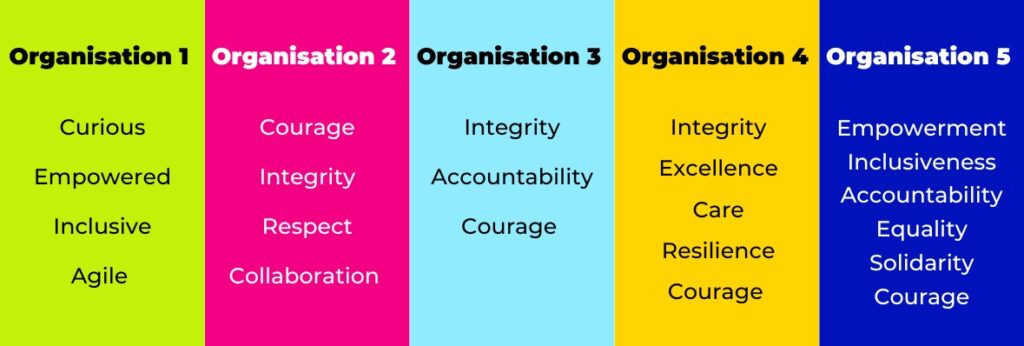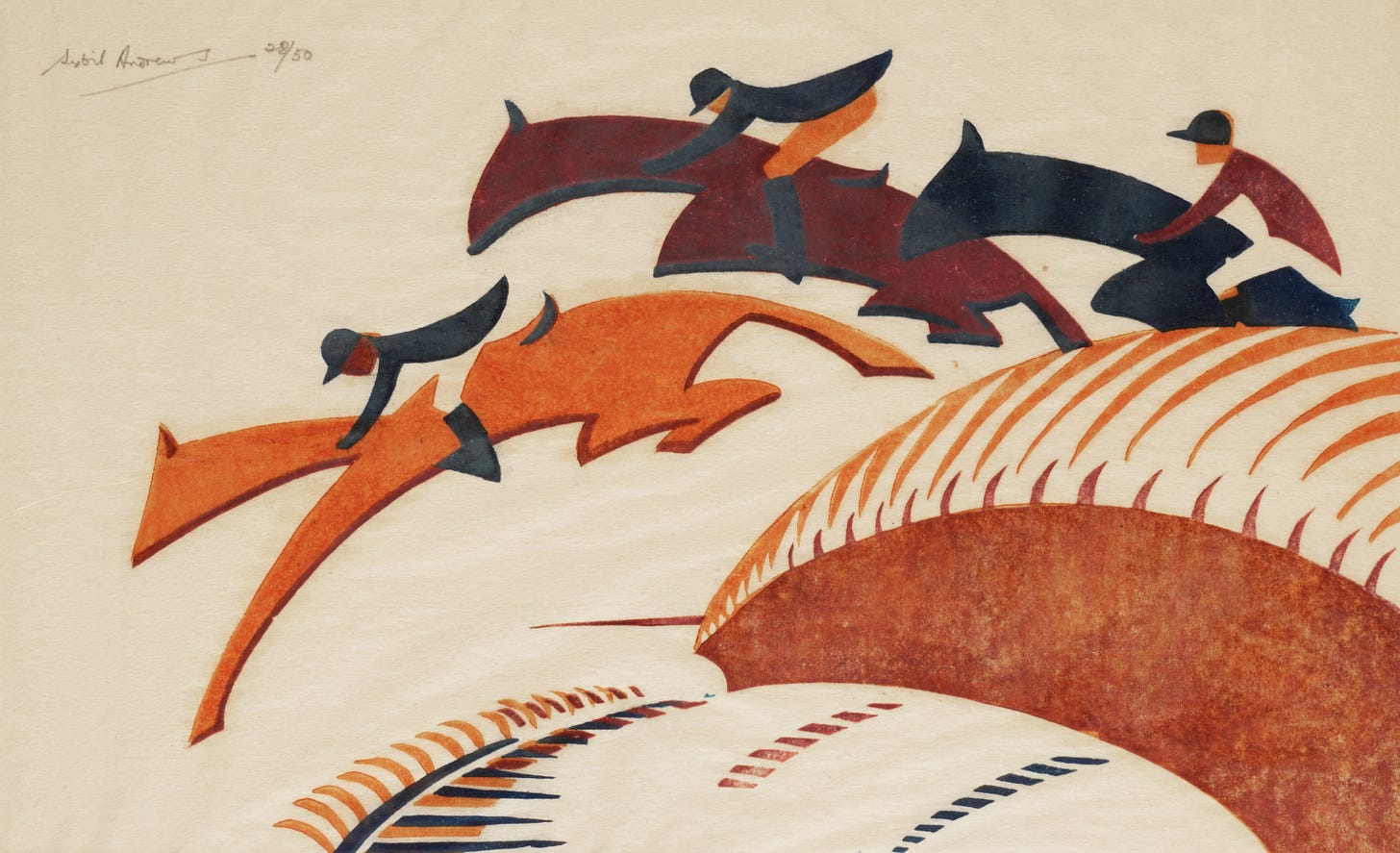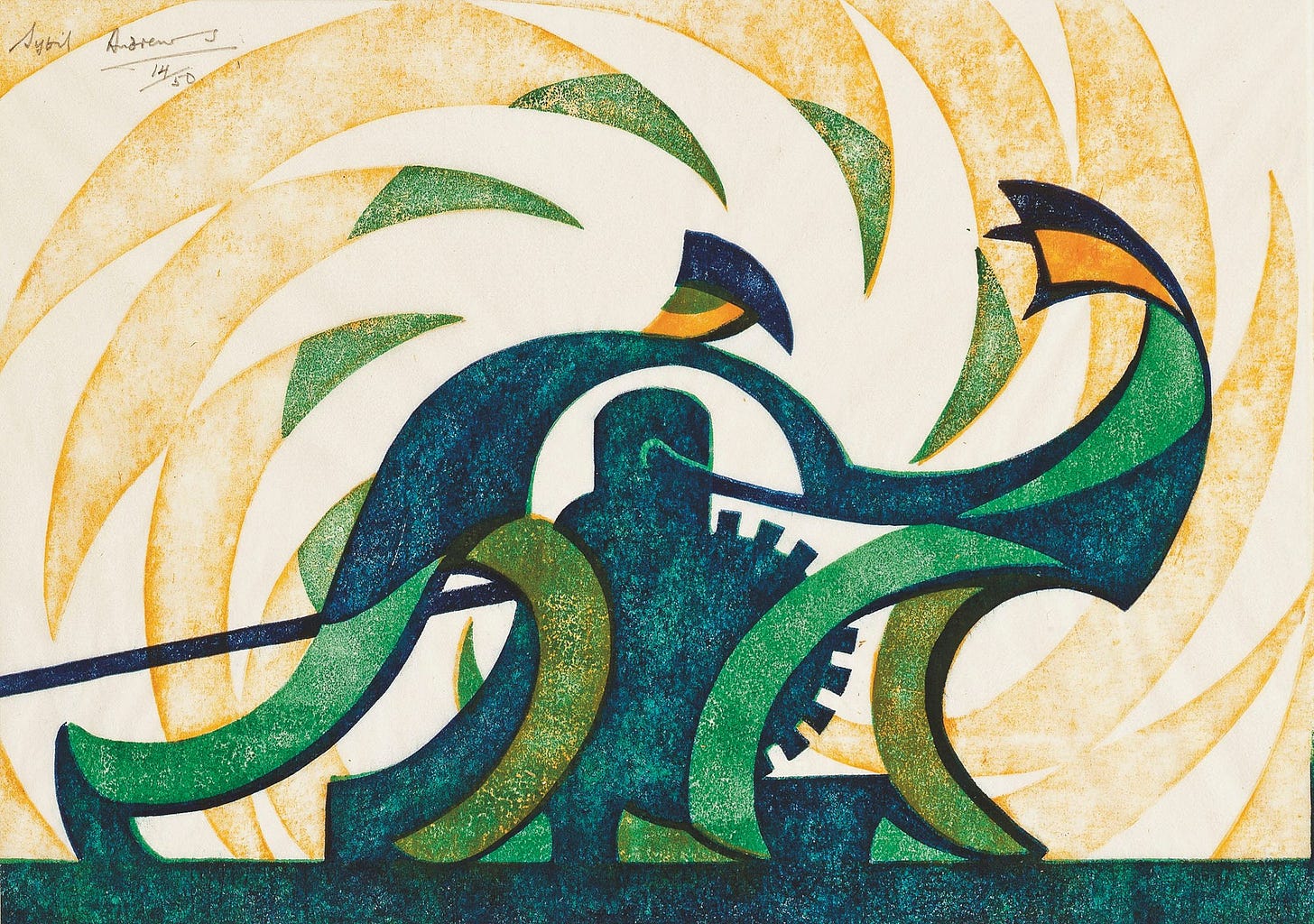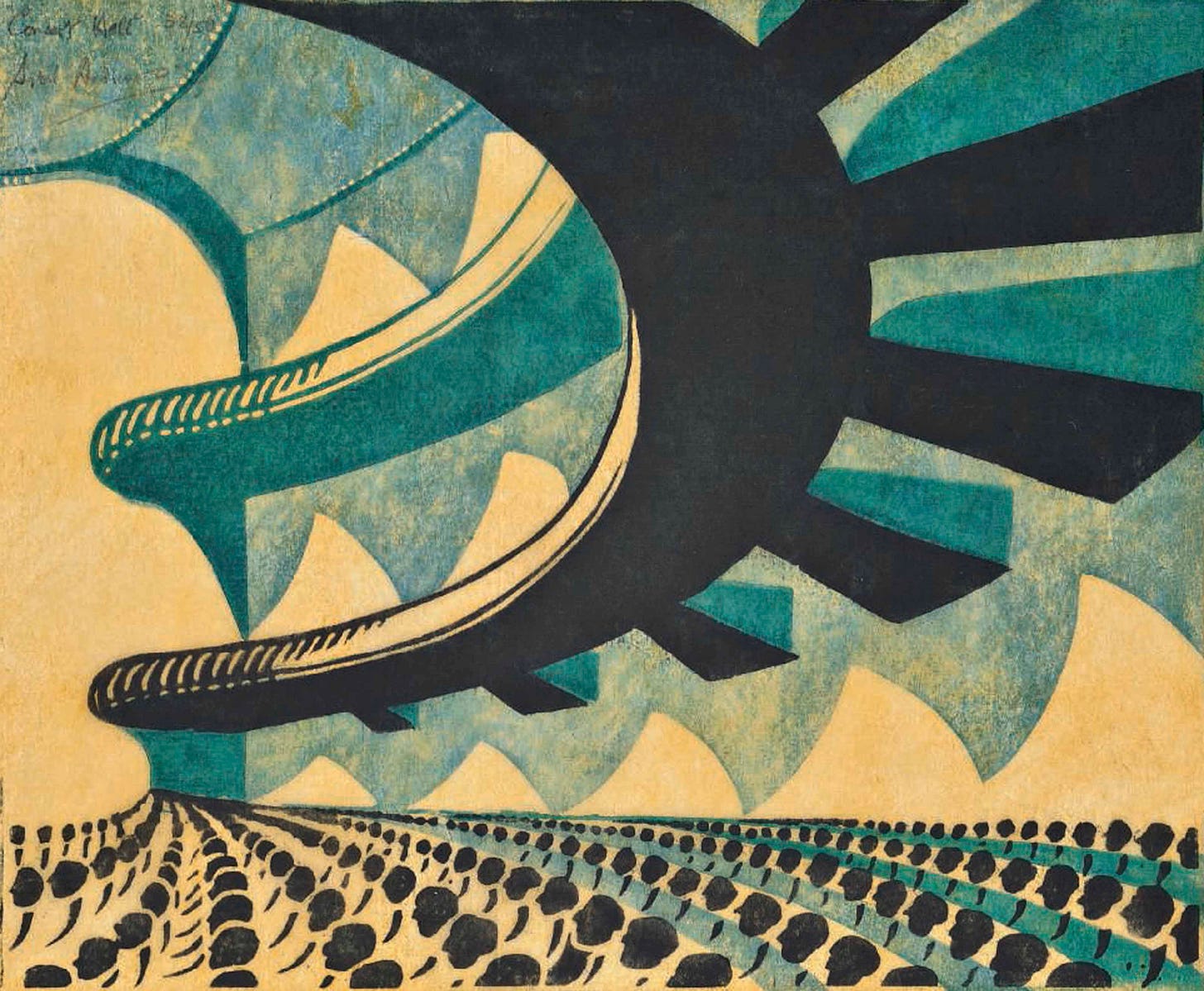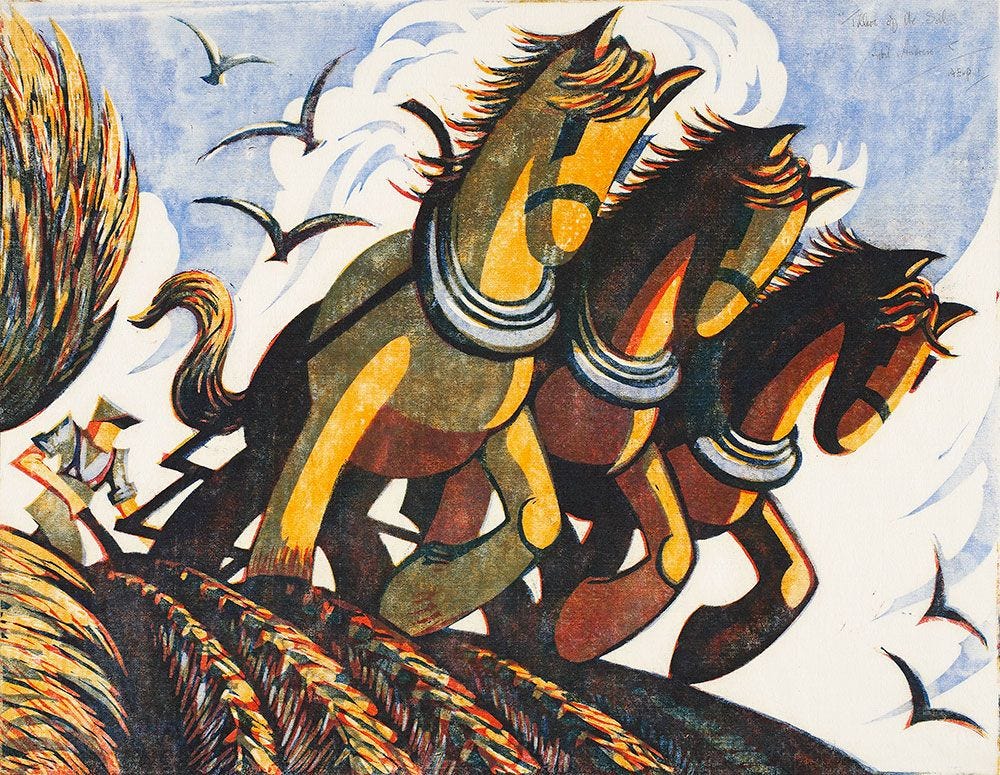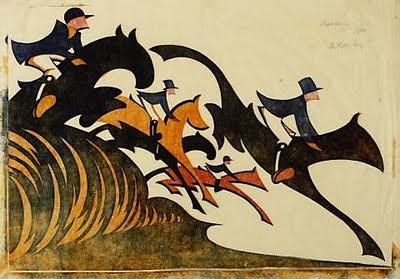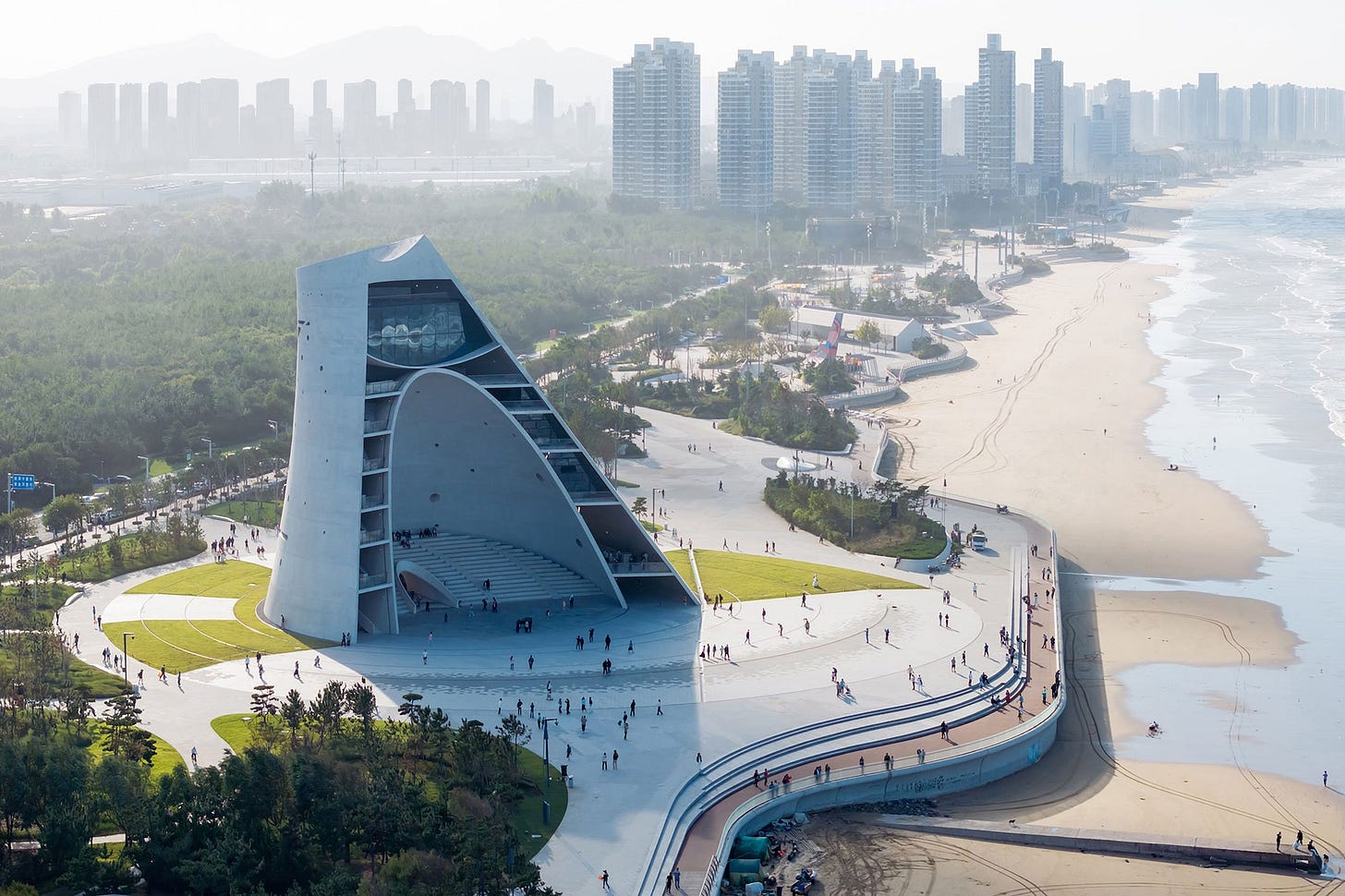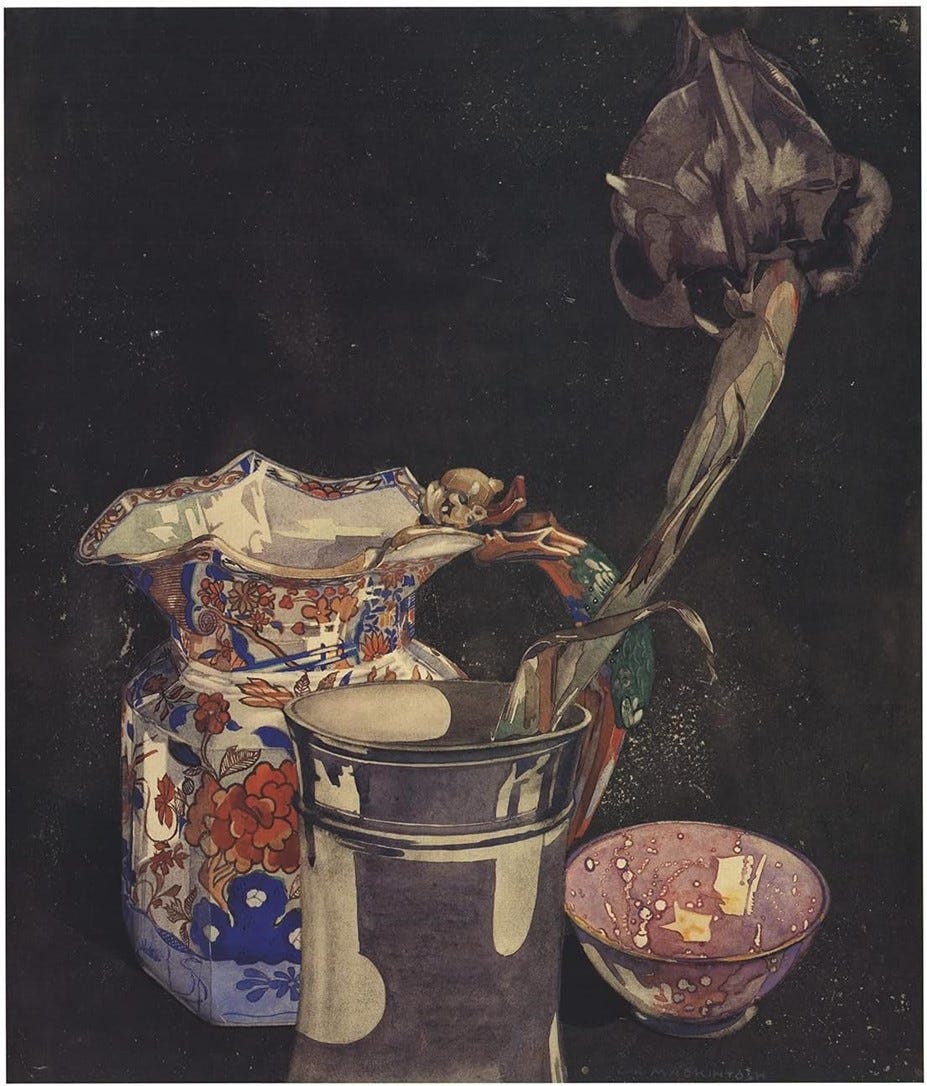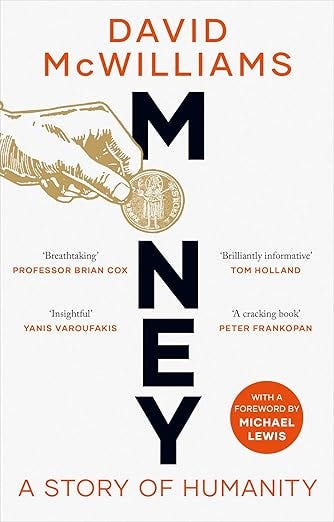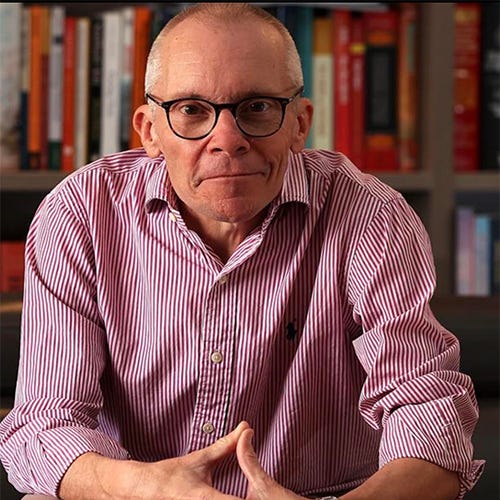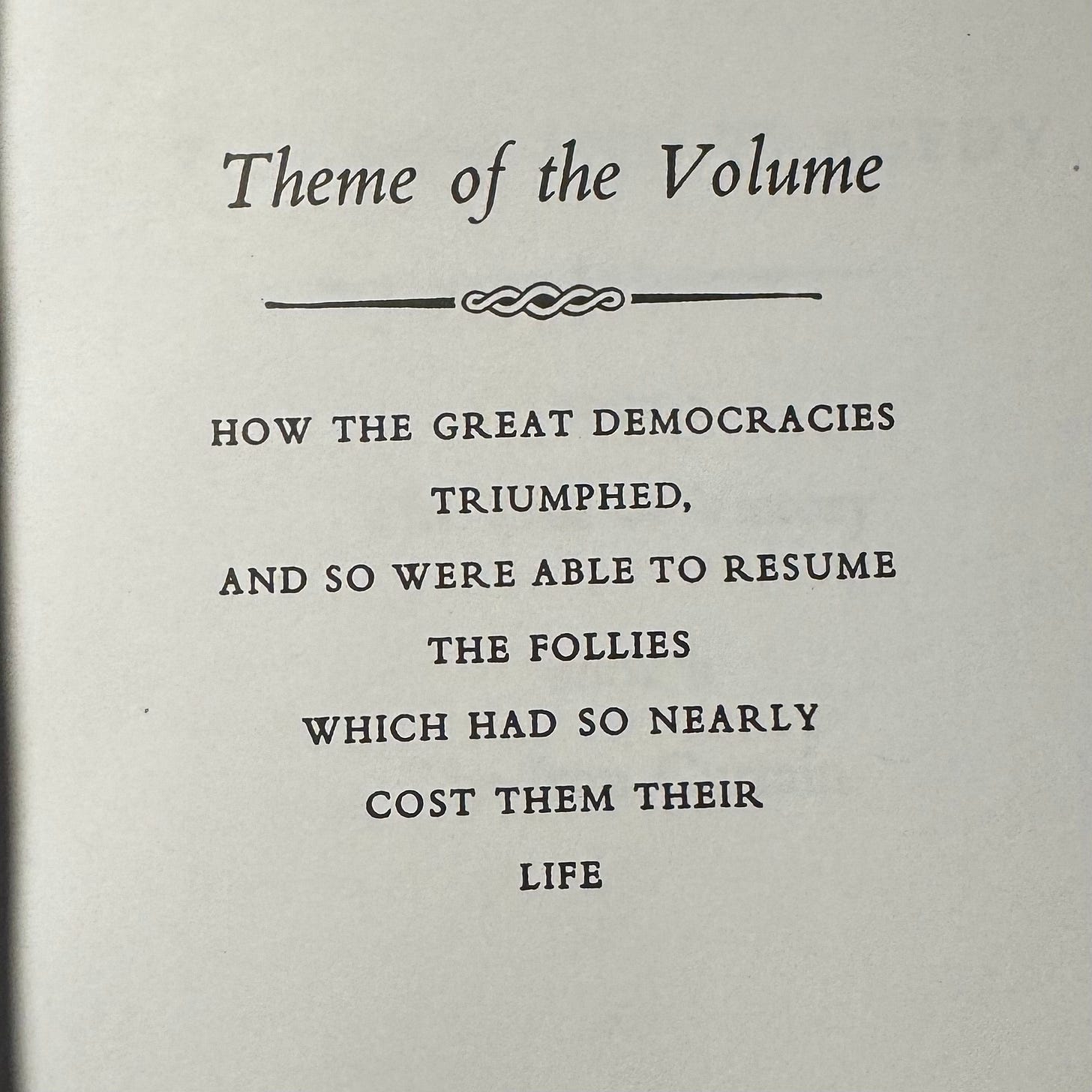Counterfeit thinking edition
An introductory essay and a bumper edition of counterfeit thinking I found on my travels
Mime, misdirection and pyramid of code
The Gregorian revolution established a form of organisation that was gradually rolled out all over the Western world and then to its followers. Constitutional monarchy: A pyramid with a chief executive at the top and beneath him a series of structures that operated as checks and balances on him and each other and a pyramid of code — laws, rules, precedents and so on.
That pyramid of code kept the entire structure unitary. At any time in such a vast structure, contradictions would turn up, but they’d be buffed back into some semblance of unity by the pyramid of code. Today if practical or political problems arise from two parts of government doing something differently, it can be sorted — administratively, legislatively or through judicial interpretation of existing law with the matter being able to go to the very top of each hierarchy for some definitive settlement.
This keeps the structure unitary at any given time, and also through time, as precedents are made, followed and/or overturned. Everything is, in principle, explainable as/reducible to this unitary order.
In words worth pondering, Ivan Illich attributes to such structures “the threefold function common to powerful churches throughout history”. They are “the repository of the society’s myth, the institutionalization of that myth’s contradictions, and the locus of the ritual which reproduces and veils the disparities between myth and reality”.
One might take such a simple and capacious statement in many different directions, but let’s just focus on the way in which the pyramid of code operates as if everything can be made explicit and as if the words within the code are or can be made determinative of any question. (The rule of law is built on this myth.)
The pyramid is a pyramid of accountability. So when something is done, if challenged it must be justified according to what's in the code. An officer makes a decision because they take a dislike to someone. But then they justify it by reference to whatever bits of code they can find lying around. It’s a big pyramid. There’s bound to be something. And large organisations are endlessly performing their accountability. (You can’t even ring them without their robot telling you that you can listen to their privacy policy.)
Anyway, these constitutional monarchies have policies, plans and strategies and people are explaining how they're addressing them with whatever they're doing. But what if people were just role-playing these functions, and the reality was different — that when strategic objectives and policies change, people just keep doing what they were doing and back-fit that to the words of the new strategy or policy?
And what if this subtle subversion went on for so long that the passage below summarised the experience of most people in and around a pyramid of code. What then?
I spent 10 years of my life writing. I wrote neighbourhood plans, partnership strategies, the Local Area Agreement, stretch targets, the Sustainable Community Strategy, sub regional infrastructure plans, funding bids, monitoring documents, the Council Plan and service plans. These documents describe the performance of local government and its partners.
I have a confession to make. Much of it was made up. It was fudged, spun, copied and pasted, cobbled together and attractively formatted. I told lies in themes, lies in groups, lies in pairs, strategic lies, operational lies, cross cutting lies. I wrote hundreds of pages of nonsense. Some of it was my own, but most of it was collated from my colleagues across the organisation and brought together into a single document. As a policy, partnerships and performance officer in local government, this was my speciality and my profession.
Why did I do it? I did this because it was my job.
That was the first thing I thought of when I watched the wonderful mime above. The mime exploits a set of presumptions we can’t help making and shows how misguided they are. The man looks like he’s being constrained by fixed points and using them to pull himself here and there. But we know that something else is going on. The magic of the mime shows us a “ritual which reproduces and veils the disparities between myth and reality”.
Just as when a values statement says “we strive for excellence in all we do”, we somehow know that’s bullshit, so we watch the mime and can see (can’t we?) the structures the performer pulls himself up on. Things expressed as ends, become means as a new set of high level strategic statements are adopted and then the lower downs get to write business-as-usual procedures out as if they were the product of the high level statement. But they’re not.
And so, as the years become decades and the decades become generations, various foundations of thought — like the difference between ends and means, values in the abstract and values demonstrated in actual choices — come unmoored. Today, it’s hard to escape the feeling that more or less everything floats freely. Meetings begin with statements which one might imagine are of immense consequence “we on Gadigal land, never ceded”. But but they mean nothing at all. They’re “fudged, spun, copied and pasted, cobbled together and attractively formatted.”
And today, compulsive explication is the process by which the myriad constitutional monarchies that rule our lives, render themselves progressively more opaque. The seventh of ten strategic priorities under Key Activity 1.1 of the Department of Industry, Science and Resources Corporate Plan is this:
Enhancing regulatory settings for businesses and the community through harmonised national frameworks. These frameworks promote ethical and sustainable market growth and the responsible use of technology, while encouraging business collaboration, innovation and investment.
I hope that’s clear then.
The pyramid of code as a locust plague
Tackling counterfeit thinking in the academy
Robin Hanson has had many ideas and I’d have expected several to work better than they have. But I think the way to express what’s wrong in a way that points to solutions is Charlie Munger’s idea that the highest form of life is a seamless web of deserved trust. This suggests that ethics might have more to offer than ever more intensified appeals to self-interest. I’d like to see what I referred here as bottom-up merit selection being used to promote academics.
Anyway, here’s the list of things that haven’t worked for Hanson. I can’t say I really understand the last one. Then again, truth be told, I can’t really work up much enthusiasm for understanding it ;)
In my 40+ years of thinking about how we might reform academia, I’ve considered many different parties as potential allies in this venture. First I and other hypertext publishing fans hoped to use backlinks to make criticism of claims easy to find from those claims, thus recruiting critics and honest readers into our reform venture. But we’ve now achieved that ease of finding criticism, without much impact. Readers care far more about publication prestige than about which criticisms are persuasive to those who read them with care.
Second, I saw the public as an ally willing to bet lots on science and related policy questions. However, we’ve seen that if academics choose to ignore such bets, the public isn’t much interested in them either. And laws continue to block such bets.
Third, I saw research patrons as allies. Surely they’d want to fund research in ways more likely to induce intellectual progress, if only they understood the better ways. Like prizes instead of grants. But then I learned about the history of academia that I summarize above. No, patrons used to use better methods, but caved when academic threatened to take away their prestige by association. Patrons care more about such prestige with academics than they do intellectual progress.
Fourth, I hoped journal editors might be allies. But when we showed that polls and prediction markets could predict which papers wouldn’t replicate, and tried to get journal editors to publicly declare that they’d consider such predictions as part of their article approval process, all the journals refused. Journals are happy to publish sexy papers that don’t replicate.
Now my best hope is to recruit as allies future folk willing to give honest appraisals of their distant past. One key claim that elite academics are not willing to give up on is this:
The people that academics now most celebrate with jobs, funding, publication, and publicity are in fact the people today who future folks centuries later, carefully considering the question, are most likely to identify as the people today who should have been listened to most for the purpose of speeding intellectual progress.
Just as we can sometimes we can get auditors, judges, juries, and even journalists to give honest independent appraisals of others’ acts and accomplishments, there’s a decent chance that we can find a ways to fund “historians” (who might not be professional credentialed as such) to look back carefully at particular areas of research, and rank past researchers in terms of who should have been listened to more. And compound interest over centuries should let us spend lots then on such evaluation, when funded today by only small amounts set aside.
Counterfeit thinking in bureaucracies everywhere
I first started making notes for a ‘counterfeit thinking’ themed newsletter when I saw various people cooing about a number of diagrams on a discussion site such as the one above. Of course this sort of navel gazing and chit-chat can’t do any harm, but the seriousness with which such ideas are taken gives the game away. The fact is that bureaucratic work involves lots of skills, lots of improvisation. You can even train for some of it. But something tells me — I can’t prove it — that this is not very useful.
And then there’s the diagram below. This stuff is British and the British are going through another round of austerity. So it’s nice I guess that some people are doing their best, looking on the bright side, and trying to cope. But how about some simpler ideas. Are we doing things efficiently? If not how can we. And to the extent that we are, what are we going to propose to give up and how. Still, such simplicity, not to mention unwelcome truth telling was never much of a career move.
If you want to read the research materials — to say nothing of the drawings, all produced by the “Researching the future public service workforce”, just go here. If you just want the diagrams go here.
Meanwhile here’s something a little more insightful — useful even.
Counterfeit values
[Y]ou can see five lists of values. Each of these lists depicts the values of a large international organisation – Oxfam International, Exxon-Mobil, Kelloggs, WWF International and Coca-Cola. Can you guess which list of values is from which organisation?
Almost impossible, right? How is it possible that five such different organisations can profess such similar values? How can WWF International and Coca-Cola or Exxon-Mobil all be claiming a similar set of values drive their work, given their immense differences? This goes some way to illustrate the limitations of organisational values.
Sure does.
Read the whole thread
Everyone deserves their hols, no-matter what it costs
Or as I put it way back in 2012 in the op ed I linked to in the tweet:
And as it sets our economic sails for a future it can only imperfectly know, Her Majesty’s Steamship RBA tames any anxiety it or we might feel about our inevitable ignorance by keeping things shipshape. The board meets to set policy on the same day each month, come rain, shine, snow or sleet. Except in January, during the silly season.
Now I don’t begrudge them a holiday, but sometimes the silly season gets serious. As it did in the summer of 2008-09 when the world wondered if that duct tape would hold as one financial market after another seized up. Some UK banks came within hours of closing ATMs. What would have happened then? But this wasn’t enough to shake the RBA’s clockwork schedule.
Rather, they explained, this gave them more confidence in cutting rates by as much as 1 point in December, since they’d be on hols till February. They didn’t explain why they didn’t cut more, or why they couldn’t hold a January meeting or depute a subcommittee to make appropriate decisions if necessary. Seriously – would we tolerate this kind of thing from firemen or ambos, or even on the wharves?
Sybil Andrews
Dean Ashenden on counterfeit concern for wellbeing
I met with some folk in a State Treasury Department in the last few years and they were getting into the wellbeing craze. Consistently with what I’ve written on the subject I said they should try to identify some ‘no-regrets’ wellbeing measures — things that would improve wellbeing at zero or negative cost.
The response? “We can’t. We have to produce a wellbeing framework.” I said that \what I’d suggested was a wellbeing framework. It’s was a framework for action rather than poncing about. It was a wellbeing cost curve which provided the framework for early action on climate change. Anyway it was water off a duck’s back. And as Dean Ashenden suggests below, all that stuff about wellbeing in schools. Well it sounds good.
It's been a bad, terrible, no-good, awful, shocking week for schools and schooling. Wherever you look - the Age/SMH, the Fin Review, The Conversation, any mainstream outlet, there they are: Results, NAPLAN Results. Which schools have blitzed it? Which high-fee parents should ask for their money back? Who are the duds? By what tiny fraction have kids done better in this, that or the other area?
The source of this torrent can be found high in the ranges of schooling's leadership, in the headquarters of ACARA (Australian Curriculum Assessment and Reporting Authority). ACARA's data are supposed to 'inform' public debate, and that in turn is supposed to encourage schools and teachers to try harder, do better, improve, 'lift their performance'.
Just which kind of 'performance' should we be worrying about? Around a fifth of kids leave school before completing, another fifth last the distance but leave with no certificate or qualification to show for it, a further fifth get a certificate but a second-rate one of little use in making the transition to the next stage of life, and of the remaining two fifths that get that mark of all marks, the ATAR, only half of them use it for tertiary entry.
The custodians of this system profess deep concern about 'wellbeing', 'engagement', 'school refusal', 'classroom disruption', 'bullying', 'harassment' and 'mental health'. In which case, why do they put all their eggs in the cognitive performance (narrowly defined) basket? Why don't we have annual metrics that tell us about the kinds of performance that (as any teacher will tell you) underlie the cognitive kind?
How about: how many kids look forward (always/often/sometimes/rarely/never) to going to school each day? Or a student safety index? Or (following the universities) a graduate survey about the worthwhileness of my 12 (or 11 or 10) years at school?
And while we're at it, why don't we ditch the annual beauty/humiliation contest? Stamp school-by-school results Educational-in-Confidence? Write new protocols to regulate access to and use of NAPLAN and other such data?
It's not the schools that need to 'lift their performance'. It's the institutions and systems that define what schools are for, and do a terrible job of it.
Josh Hawley goes after gougers
He also thought the Jan 6th riot wasn’t so bad, but there you go. We have to get used to them I guess.
Themes: counterfeit thinking made easy
An old post in which I try to explain just how much the OECD smacked my gob and flabbered by ghast with its own counterfeit thinking.
We now have a new high watermark in this practice. It's quite a milestone because it's not just PR infected action, it's PR infected thinking and policy advice. I just received an email from the OECD (as I'm subscribed somehow to their emails to journalists) and the headline made no sense. "Tackling policy fragmentation: the key to getting onto a path of rapid and sustainable productivity growth, OECD says".
"Hmm", I thought. "What kind of policy fragmentation?" The press release begins.
Further structural reforms are needed to help the business sector boost productivity growth and overcome the key challenges of sluggish investment in advanced economies and excess capacity in emerging economies, according to a new OECD report.
All pretty standard boilerplate. After another boilerplate paragraph, things get seriously weird.
“If we want to get onto a path of stronger and more sustainable growth, we need better coordinated policies that put the pieces of our fragmented world back together in a more harmonious way,” said OECD Secretary-General Angel Gurría, launching the report in Paris. “Structural policy action will be critical to improve the incentives for corporate research and development, remove biases against equity financing of firms, and dismantle obstacles to the integration of renewables into electricity networks, to name just a few areas mentioned in the report.”
So what does the OECD mean by 'fragmented'. What's got more fragmented? Are we talking about fragmented markets? Is the solution more concentrated markets? Then we get this:
The report points out that fragmentation can be observed in a variety of business environments, including in financial markets where information technology and regulatory reforms have paved the way for fragmentation with respect to an increased number of stock trading venues and created so called “dark trading”. Differences in regulatory requirements and disclosure among today’s trading venues have raised concerns about stock market transparency and equal treatment of investors. Also corporations may be affected negatively if speed and complexity is rewarded over long-term investment.
Different legal regimes across countries and in the growing network of international investment treaties also fragment the business environment. National laws in different countries sanction foreign bribery with uneven and often insufficient severity, and many investment treaties have created rules that can fragment companies and disrupt established rules on corporate governance and corporate finance.
Finally, clean energy represents another important sector in which market fragmentation needs to be addressed, as overall investment in renewable projects remains constrained by trade barriers and other policies.
Policymakers should support R&D better, as it is one of the most important contributors to productivity growth. Fiscal incentives should be smarter and directed at specific barriers, impediments or synergies to facilitate the desired level of investment in R&D. Tax policies should stop favouring debt over equity finance. Governments should also promote openness to markets, including for corporate control – both between countries and within them, where domestic rules and lack of cooperation among competition authorities can often block entry.
Dark trading and fragmentation ey? Who'da thunk? Well dark trading is probably a worse thing than light filled trading. But who knew it was holding back productivity? And "Different legal regimes across countries". Now there's problem. Sometimes it's regarded as a feature not a bug. At least since the Peace of Westphalia. But the OECD hasn't yet got a blueprint for World Government so it's unclear what is on its mind. Is it for or against the "growing network of international investment treaties". How does it propose that the fragmentation it thinks is eating away at recovery from the GFC be addressed? Since "clean energy represents another important sector in which market fragmentation needs to be addressed" how should we address it, and why is it more important than other sectors to get the de-frag treatment?
Intrigued by this strange turn of events, in which all the same things turn up, but with 'fragmentation' added as the key problem, I headed to the report's webpage. And it was all cleared up for me (emphasis added).
It is seven years since the global crisis and despite easy monetary policy, financial regulatory reform, and G20 resolutions favouring structural measures, the world economy is not making a lot of progress. Indeed, the responses to the crisis seem mainly to have stopped the banks from failing and then pushed the many faces of the crisis around between regions—currently taking the form of excess capacity in emerging markets. Productivity growth raises income per head, allows companies to pay better wages and it raises demand to help to eliminate excess capacity and improve employment. However, this element is missing in the global corporate sector. The theme of this year’s Business and Finance Outlook is fragmentation: the inconsistent structures, policies, rules, laws and industry practices that appear to be blocking business efficiency and productivity growth [emphasis added].
Anyway to raise some housekeeping matters, the Troppo collective has decided on monthly themes and starting from today the theme is "sustainability". All posts and comments will need to be about sustainability to fit with our theme. Next month the theme will be 'exceeding the customer's expectations'. The schedule beyond that is:
Ending counterfeit democracy
The new sun tower in Yantai, China
Very nice. More here.
Real pollution: counterfeit solutions
As this piece for the Conversation makes clear, international talks on plastics pollution broke down recently. Why? Because campaigners asserted that “The treaty must take action at each stage of a plastic item’s life cycle.” If you want to check plastic pollution you should check plastic production right? Well no. Over 80% of the plastics ending up in the environment end up there because of the failing waste management systems of poor countries. So that’s where you’d stop plastic pollution. But there was barely a mention of it in any of the coverage, including the ‘high(ish) brow’ coverage in the Conversation.
When I was a lad I recall Sydney’s beaches weren’t really safe to swim in. They were full of e-coli. Why. Because of Sydneysiders shit making its way into the beaches. It’s kind of a miracle, but even though Sydney’s got hundreds of thousands more people, they must all be holding it in, because there’s very little shit in the beaches. A real tribute to them I’d say.
Oh, and we should do more kerbside recycling and reduce waste going to landfill — even if its benefits to the environment are mixed and marginal.
Matt’s guide to the MetaCrisis
The term ‘metacrisis’ has always irritated me. Oh, I realised on starting to write that sentence that ‘polycrisis’ is now the term du jour. Anyway, as the thinking gets heavier, so does the counterfeit thinking. I mean there’s no place thinking has ever gone that counterfeit thinking can’t get to. In fact, just as Mark Twain is supposed to have said that a lie can travel round the world before truth gets its boots on — or something like that, counterfeit thinking gets there a lot quicker and can power on well beyond the point at which thinking has to admit it’s beaten. Anyway, here’s a fun send up of three bearded gentlemen being very, very serious about our predicament.
Lets set the scene. Iain McGilchrist is famous for writing the Master and Commander series featuring tales of daring-do during the Napoleonic Wars. John Vervaeke directed Starship Troopers and Showgirls - both of which were based on the classic texts of Theravada Buddhism. I think Daniel Schmachtenberger operates a craft brewery in Red Hook. Some of the preceding facts may be incorrect. I may not have done any background research beyond watching the video.
Let me make some wholly uninformed comments.
The Metacrisis apparently covers everything. Climate change, nuclear war, AI, anxiety, the loss of the sacred, a focus on utility, me accidentally washing my favorite socks at too high a temperature last Thursday, etc. Unsurprisingly, this is all very depressing. I despair for the future of humanity. And my favorite socks no longer fit.
The tone is very serious and high-modernist. Every sentence seems packed with Abstract Nouns with Capital Letters (e.g. Meaning, Anxiety, Purpose, Logos, Religio, The Sacred, Geist, My Arse, etc).
“The world can’t be absurd, right?” - Well, we’re going to have to disagree on that John. I think the world is fundamentally absurd. That’s pretty much the premise of everything I write here. …
“We need to find a way out of this that involves restraint” - Iain, you’re on a 3 hour 21 minute video. I think it’s a bit late to be calling for restraint.
“If we convince 3% of the world’s influential people” - So we are merely one Davos talk away from solving The Metacrisis, Iain?
I’m not sure Meaning Starvation is a thing, John. …
“I'm not suggesting that we just sit back” - YOU’RE LITERALLY SITTING BACK IN A CHAIR, IAIN!!!
“But if the student is in fact basically psychopathic” - Quick cross-promotion here. …
“A polar bear can’t make nukes” - But what if it could? FINALLY some out of the box thinking. …
“So I would put the origin of the metacrisis not with evolutionary processes, but with the beginning of stone tools.” - Yes. He surely will. I do expect some of the Bronze Age Pervert types to chime in with: “Things were already f-ed by the Bronze Age. The Stone Age even. We need to return to times before human had mastered tools. And were just shredded. With protein powder and Nietzsche”.
“Can we imagine a humanity that has the wisdom to steward that power reasonably well?” - I’m going with a “no” for this. Have you met humanity? But I am also stupid enough to believe that we might fail to destroy ourselves if only because we fail at a lot of things. Although I’m about 2 hours in here. And at this point I am beginning to view the destruction of humanity as a positive. …
“How big is the uniqueness of your wife? …This is not a sensible question” - Iain, on this we are agreed. It is a question that will only lead to pain and suffering. …
Perhaps if we try to fix everything then we will end up fixing nothing. Perhaps we should just try to change one small thing first.
Who knows. In future years, this YouTube video may be cited as the trigger for a massive societal transformation. Frankly I think that’s more likely to be a 14 year old on TikTok.
But then I know nothing.
*Sandworms excepted.
Is Peter Turchin a counterfeit thinker?
I’m instinctively hostile to the idea that what’s worthwhile in history is what can be quantified with a view to deducting ‘laws’ from it. This was quite a strong craze in a substantial faction of academic historians way back in the 1950s. It was bollocks — junk philosophy, junk science — but it rears its head every now and again.
I’ve mostly ignored Peter Turchin but watched people I respect (and some I don’t) praise him to the skies. “So maybe I’m wrong” I’ve been thinking, but I can’t say I’ve spent much time finding out. That stuff just isn’t that interesting unless it’s really turning up surprising ideas that are well supported by the evidence. Anyway, I doubt I’ll bother now. Here’s Yascha Monk (also quoting Francis Fukuyama) doing the heavy lifting.
Over the course of the last decade, a seductive idea has conquered the discourse: the notion that the sudden surge in political instability in democracies like the United States has been due to “elite overproduction” and the subsequent formation of a “surplus elite.”
In the description of Peter Turchin, the Russian-American beetle-expert-cum-political-forecaster who popularized these terms, the overproduction of elites consists in “the presence of more elites and elite aspirants than the society can provide positions for.” The rise of a class of people who aspire to elite status only to see their expectations dashed, he argues, is “inherently destabilizing.”
America does indeed seem to be going through a period of prolonged turmoil. (Think the Tea Party and Occupy Wall Street, the summer of 2020 and the assault on the Capitol, plus of course the election of Donald Trump.) And so Turchin’s idea is suddenly everywhere. A few years ago, Graeme Wood, an excellent reporter who usually has a sure nose for bullshit, gave Turchin a respectful hearing in the pages of The Atlantic. Since then, his books have attracted praise from eminent historians like Niall Ferguson, economists like Angus Deaton, and even military leaders like James Stavridis. (“Peter Turchin,” writes the four-star admiral, “provides a powerful synthesis of the historical forces that have brought American society to the dangerous ledge upon which it now teeters.”)
But is the idea of surplus elites actually true, useful—or even coherent? …
As Francis Fukuyama pointed out in an appropriately scathing review of Turchin’s latest book, he “is able to detect elite overproduction in so many historical eras because he has a flexible definition of ‘elite.’ Who qualifies as an elite today? The category sometimes includes the top 1 percent of the income distribution, the top 10 percent, or any college-educated professional.”
Charles Rennie Mackintosh ~ White Tulips / Grey Iris
Speaking of counterfeiting …
You should get yourself a good book on money. What it is, what it means. I now have two friends who’ve written books on money. Felix Martin over a decade ago and now Kilkenomics founder David McWilliams. Here’s the IMF review.
Proficiency with the “ingenious technology” of money accompanied innovations like writing, math, law, democracy, and philosophy. But does money enable such breakthroughs, or did they guide money’s evolution? This chicken-or-egg question animates David McWilliams’s surprisingly memorable joyride through 5,000 years from early coins to crypto.
Money: A Story of Humanity opens by noting that writing came about only because of money—the oldest name to have survived in written form is, naturally, a debtor. Throughout, McWilliams is an enthusiastic narrator of “one of the most seductive and enduring ideas,” a skillful, conversational storyteller unpacking money’s joys and horrors.
“Our entire world revolves around this strange, invented notion,” writes McWilliams, who puts human history into the sweeping context of “one foundational technology, often overlooked, that underpinned and animated human flourishing.”
People predominate. McWilliams chronicles the rise of money through Nero, Jesus, Johannes Gutenberg, Charles Talleyrand, Alexander Hamilton, and Charles Darwin, whose theory of life leapt from the pages of an economics book by Thomas Malthus. Some are brilliant characters, others scoundrels. Many use money to divide, or worse. Empires use money as warfare. European financial innovations unleash colonialism.
McWilliams makes his sixth book a lively tale. He may be uniquely qualified to do so. He was a monetary economist at the Central Bank of Ireland and forecaster for commercial banks before flourishing as an author, journalist, documentarian, and host of what must be the only economics and comedy festival, Kilkenomics, in Kilkenny, Ireland. He kicked around some of the yarns later used in the book on his eponymous podcast. The self-described chatty writer has said it helps him frame concepts to better resonate for all.
He calls the book “a romp with an economist,” but one disappointed in “his own tribe’s ability to tell the story of money.” He faults the profession for taking the fun out of money, and not always understanding it—plumbers aware of how pipes work but not “why water is essential for life.” McWilliams makes money exciting and shows how it changes us and fuels our deepest urges, good and evil.
McWilliams draws from and builds on authors with like titles, including Money by Eric Lonergan and Felix Martin’s Money: The Unauthorised Biography. He credits a shelf of histories, including The Price of Time: The Real Story of Interest by Edward Chancellor.
Some may wonder why a story of universal human experience so centers on Europe, touching other cradles of money, like China, only in passing. The Dublin-based author cites a need for selective focus on linking innovation in money to human progress. He acknowledges that others elsewhere tell equally valid stories. His chapter on transitioning into the 20th century is even more local, profiling James Joyce as an artist-entrepreneur opening Dublin’s first cinema in 1909. But even this digression somehow weaves the Suez Canal, Karl Marx, and the role of thriving, tolerant, open cities like Trieste into an improbable lesson on Europe’s economic gains—soon undone by war.
Money delivers the romp, establishing how an abstraction binds us and defines us.
Wrongful detention? She’ll be right
Here’s Sean Turnell, lovely bloke imprisoned by the Burmese for trying to help Burma. Naturally you’ll be pleased to hear that, like other arms of the Australian Government protecting integrity, DFAT is fierce in its defence of … well business-as-usual. In the words of the new mission statement hanging in the foyer of DFAT’s head office in Canberra and in Australian embassies around the world “Now is the time for complacency”.
Last week the Australian Senate’s Standing Committee on Foreign Affairs, Defence and Trade handed down its report into the wrongful detention of Australian citizens overseas. A phenomenon that unfortunately only continues to grow, such wrongful detention (often referred to as “hostage diplomacy”) is increasingly used by authoritarian regimes around the world as a tool of leverage over democratic countries and their foreign policy. The United States, Canada, and some European countries have recognised the threat, and in recent years have crafted new strategies and institutions to “disincentivise” the practice.
Up until now Australia has stood back from this momentum, favouring what Australia’s Department of Foreign Affairs and Trade (DFAT) calls “flexibility” in dealing with instances of wrongful detention on a case-by-case basis. I was one of those cases, imprisoned in Myanmar following the 2021 coup until November 2022.
The Senate committee effectively found against DFAT’s approach, and … made [these] recommendations, that the Australian government:
Adopt a clear definition of wrongful detention, collect data on its occurrence, and increase public awareness of the practice. …
Create a “Special Envoy for Wrongfully Detained Australians”, resource the position properly. …
To deter wrongful detention, should unambiguously call out hostage diplomacy, label it as a serious and egregious form of foreign interference, and make it clear that there will be severe diplomatic consequences from the behaviour.
Should sanction senior officials responsible for the wrongful detention of Australians, including members of the judiciary for authorising such imprisonment. …
In its own submission … DFAT pushed back against much of the above … This was rejected in the testimony of Kylie Moore-Gilbert, Director of the Australian Wrongful and Arbitrary Detention Alliance (and a hostage of the ruling regime of Iran for 805 days in 2018–20), and by the renowned Australian jurist Geoffrey Robertson. [They} also expressed … their disappointment that Australia had not employed Magnitsky-style sanctions against individuals involved in wrongfully detaining Australians …
The 6th volume of Churchill’s history of WWII
From Alan Jacobs
Each of the six volumes of Churchill's history of the second world war has a Theme. Here'e the one for the final volume.
A bit of non-counterfeit art (25 second highlight: SHOCK!)
Heaviosity half hour
The age of anger
Well, I’m late on the scene as ever, but there you go. This is quite a striking book which I’ve been enjoying reading. It’s a bold attempt to uncover much of the intellectual and social terrain of our current discontents in the Enlightenment and to tell the history of those discontents from then.
It brings home something that is rarely top of mind. We might think of the modern world as one hell of a place to inhabit compared to what came before, but getting here was a brutal business — as the land on which people survived was enclosed to enrich the wealthy and people, including little kids were herded into gruelling, inhuman factories. And yes, they did it voluntarily, so in some sense working in the factories was better than the alternative.
The author — Pankaj Misra — is also unafraid to go with various rushes of blood to the head, as for instance when he says this:
Seized by a competitive fever, and taunted by the possibility that they are set up to lose, even the relatively affluent become prone to inventing enemies – socialists, liberals, a dark-skinned alien in the White House, Muslims – and then blaming them for their own inner torments. Islamophobia can only flourish in these circumstances, empowering demagogues just as popular anti-Semitism did during the crises of modernizing Europe.
Yes, well at least when I last looked anti-Semitism didn’t follow in the wake of Jewish terrorism. There are similar lapses, but it’s generally a very vigorous, and provocative take of some terrificness.
Prologue
Everywhere, people are awaiting a messiah, and the air is laden with the promises of large and small prophets … we all share the same fate: we carry within us more love, and above all more longing than today’s society is able to satisfy. We have all ripened for something, and there is no one to harvest the fruit …
Karl Mannheim (1922)
In September 1919 the Italian poet Gabriele D’Annunzio, accompanied by two thousand Italian mutineers, occupied the Adriatic town of Fiume. The writer and war hero, one of the most famous Europeans of his time, had long wanted to capture all the territories that he believed had always been part of ‘Mother Italy’. In 1911 he had zealously supported Italy’s invasion of Libya, an expedition whose savagery stoked outrage across the Muslim world. Amid the chaos at the end of the First World War, and with the collapse of the region’s previous ruler, D’Annunzio saw a chance to realize his dream of rejuvenating Italian manhood through violence.
Installed as ‘il Duce’ of the ‘Free State of Fiume’, D’Annunzio created a politics of outrageous rhetoric and gestures – politics in the grand style. He invented the stiff-armed salute, which the Nazis later adopted, and designed a black uniform with pirate skull and crossbones, among other things; he talked obsessively of martyrdom, sacrifice and death. Benito Mussolini and Adolf Hitler, then obscure men, were keen students of the pseudo-religious speeches this shaven-headed man delivered daily on his balcony to his black-shirted ‘legionnaires’ (before retreating to his sexual partners of the day).
Eager volunteers – testosterone-driven teenagers as well as pedantic socialists – came from places as far away as Ireland, India and Egypt to join Fiume’s carnival of erotic militarism. For them, life, devoid of its old rules, seemed to be beginning all over again: a purer, more beautiful and honest existence.
As the months passed, and his sexual appetite and megalomania deepened, D’Annunzio began to see himself leading an international insurrection of all oppressed peoples. In practice, this short-statured man of humble provincial origins, a parvenu who tried to pass himself off as an aristocrat, remained simply an opportunistic prophet for angry misfits in Europe: those who saw themselves as wholly dispensable in a society where economic growth enriched only a minority and democracy appeared to be a game rigged by the powerful.
Frustrated men had defined whole new modes of politics, from nationalism to terrorism, since the French Revolution. Many in France itself had long been affronted by the hideous contrast between the glory of both the revolution and the era of Napoleon and the mean compromises that followed of economic liberalism and political conservatism. Alexis de Tocqueville had repeatedly called for a great energizing adventure: the ‘domination and subjugation’ of the Algerian people and the creation of a French Empire in North Africa. As the century ended, a trash-talking demagogue called General Georges Boulanger rose swiftly on the back of mass disgust over moral scandals, economic setbacks and military defeats, and came perilously close to seizing power.
In the 1890s, as the first phase of economic globalization accelerated, xenophobic politicians in France demanded protectionism while targeting foreign workers – angry Frenchmen massacred dozens of Italian immigrant labourers in 1893. White supremacists in the United States had already stigmatized Chinese workers with explicitly racist laws and rhetoric; these were meant, along with segregationist policies against African-Americans, to restore the dignity of a growing number of white ‘wage slaves’. Demagogues in Austria-Hungary, who scapegoated Jews for the mass suffering inflicted by the anonymous forces of global capitalism, sought to copy anti-immigrant legislation introduced in America. The Western scramble for Asia and Africa in the late nineteenth century revealed that the political therapy offered by Cecil Rhodes – ‘he who would avoid civil war must be an imperialist’ – had become increasingly seductive, especially in Germany, which, though successfully industrialized and wealthy, had fostered many angry malcontents and proto-imperialists. At the dawn of the twentieth century, as the world experienced global capitalism’s first major crises, and the greatest international migration in history, anarchists and nihilists seeking the liberation of individual will from old and new shackles burst into terroristic violence. They murdered numerous heads of state, including one American president (William McKinley), in addition to countless civilians in crowded public spaces.
D’Annunzio was only one of the many manipulators in a political culture wrought by the West’s transition to industrial capitalism and mass politics – what the Indian poet Rabindranath Tagore, touring the United States in 1916, called a ‘dense poisonous atmosphere of world-wide suspicion and greed and panic’. In Italy, the invasive bureaucracy of the new state, and its brazen indulgence of a rich minority, made the young in particular more vulnerable to fantasies of vengeful violence. As The Futurist Manifesto, produced in 1909 by D’Annunzio’s admirer the poet Filippo Marinetti, proclaimed:
We want to glorify war – the world’s only hygiene – militarism, patriotism, the destructive act of the anarchists, the beautiful ideas for which one dies, and contempt for women. We want to destroy museums, libraries and academies of all kinds.
For fifteen months in Fiume, D’Annunzio rabble-roused through his experiment in ‘beautiful ideas’, in contemptuous defiance of all the world’s great military powers. His occupation ended tamely, after the Italian navy bombarded Fiume in December 1920, forcing D’Annunzio to evacuate the city. But a whole mass movement – Mussolini’s fascism – carried on where he had left off. The poet-imperialist died in 1938, three years after Italy had invaded Ethiopia – a ferocious assault that he predictably applauded. Today, as alienated radicals from all over the world flock to join violent, misogynist and sexually transgressive movements, and political cultures elsewhere suffer the onslaught of demagogues, D’Annunzio’s secession – moral, intellectual and aesthetic as well as military – from an evidently irredeemable society seems a watershed moment in the history of our present: one of many enlightening conjunctures that we have forgotten.
* * *
Savage violence has erupted in recent years across a broad swathe of territory: wars in Ukraine and the Middle East, suicide bombings in Belgium, Xinjiang, Nigeria and Turkey, insurgencies from Yemen to Thailand, massacres in Paris, Tunisia, Florida, Dhaka and Nice. Conventional wars between states are dwarfed by those between terrorists and counter-terrorists, insurgents and counter-insurgents; and there are also economic, financial and cyber wars, wars over and through information, wars for the control of the drug trade and migration, and wars among urban militias and mafia groups. Future historians may well see such uncoordinated mayhem as commencing the third – and the longest and strangest – of all world wars: one that approximates, in its ubiquity, a global civil war.
Unquestionably, forces more complex than in the previous two great wars are at work. The violence, not confined to any fixed battlefields or front lines, feels endemic and uncontrollable. More unusually, even this war’s most conspicuous combatants – the terrorists – are hard to identify.
Attacks on Western cities since 9/11 have repeatedly provoked the questions: ‘Why do they hate us?’ and ‘Who are they?’ Before the advent of Donald Trump, the Islamic State of Iraq and Syria (ISIS) deepened a sense of extraordinary crisis in the West with its swift military victories, its exhibitionistic brutality, and its brisk seduction of young people from the cities of Europe and America.
ISIS has seemed to pose to many even more perplexing questions than al-Qaeda did. Why, for instance, has Tunisia, the originator of the ‘Arab Spring’ and the most Westernized among Muslim societies, sent the largest contingent among ninety countries of foreign jihadis to Iraq and Syria? Why have dozens of British women, including high-achieving schoolgirls, joined up, despite the fact that men from ISIS have enslaved and raped girls as young as ten years old, and have stipulated that Muslim girls marry between the ages of nine and seventeen, and live in total seclusion?
An anonymous writer in The New York Review of Books, a major intellectual periodical of Anglo-America, says that ‘we should admit that we are not only horrified but baffled’ and that ‘nothing since the triumph of the Vandals in Roman North Africa has seemed so sudden, incomprehensible, and difficult to reverse’.
Some of the Islam-centric accounts of terrorism have translated into the endless ‘global war on terror’, and no less forceful – or quixotic – policies aimed at encouraging ‘moderate’ Muslims to ‘prevent’ ‘extremist ideology’, and ‘reform’ Islam. It has become progressively clearer that political elites in the West, unable to junk an addiction to drawing lines in the sand, regime change and re-engineering native moeurs, don’t seem to know what they are doing and what they are bringing about. …
There is a pervasive panic, which doesn’t resemble the centralized fear emanating from despotic power. Rather, it is the sentiment, generated by the news media and amplified by social media, that anything can happen anywhere to anybody at any time. The sense of a world spinning out of control is aggravated by the reality of climate change, which makes the planet itself seem under siege from ourselves.
* * *
This book takes a very different view of a universal crisis, shifting the preposterously heavy burden of explanation from Islam and religious extremism. It argues that the unprecedented political, economic and social disorder that accompanied the rise of the industrial capitalist economy in nineteenth-century Europe, and led to world wars, totalitarian regimes and genocide in the first half of the twentieth century, is now infecting much vaster regions and bigger populations: that, first exposed to modernity through European imperialism, large parts of Asia and Africa are now plunging deeper into the West’s own fateful experience of that modernity.
The scope of this universal crisis is much broader than the issue of terrorism or violence. Those routinely evoking a worldwide clash of civilizations in which Islam is pitted against the West, and religion against reason, are not able to explain many political, social and environmental ills. And even the exponents of the ‘clash’ thesis may find it more illuminating to recognize, underneath the layer of quasi-religious rhetoric, the deep intellectual and psychological affinities that the gaudily Islamic aficionados of ISIS’s Caliphate share with D’Annunzio and many other equally flamboyant secular radicals in the nineteenth and early twentieth centuries: the aesthetes who glorified war, misogyny and pyromania; the nationalists who accused Jews and liberals of rootless cosmopolitanism and celebrated irrational violence; and the nihilists, anarchists and terrorists who flourished in almost every continent against a background of cosy political-financial alliances, devastating economic crises and obscene inequalities.
We must return to the convulsions of that period in order to understand our own age of anger. For the Frenchmen who bombed music halls, cafés and the Paris stock exchange in the late nineteenth century, and the French anarchist newspaper that issued the call to ‘destroy’ the ‘den’ (a music hall in Lyon) where ‘the fine flower of the bourgeoisie and of commerce’ gather after midnight, have more in common than we realize with the ISIS-inspired young EU citizens who massacred nearly two hundred people at a rock concert, bars and restaurants in Paris in November 2015.
Much in our experience resonates with that of people in the nineteenth century. German and then Italian nationalists called for a ‘holy war’ more than a century before the word ‘jihad’ entered common parlance, and young Europeans all through the nineteenth century joined political crusades in remote places, resolved on liberty or death. Revolutionary messianism – the urge for a global, definitive solution, the idea of the party as a sect of true believers, and of the revolutionary leader as semi-divine hero – prospered among Russian students recoiling from the cruelty and hypocrisy of their Romanov rulers. Then as now, the sense of being humiliated by arrogant and deceptive elites was widespread, cutting across national, religious and racial lines.
* * *
History, however, is far from being repeated, despite many continuities with the past. Our predicament, in the global age of frantic individualism, is unique and deeper, its dangers more diffuse and less predictable.
Mass movements such as Nazism, Fascism and Communism, which claimed to innovatively mobilize collective energies, led to the wars, genocide and tyrannies of early twentieth-century Europe. But the urge to create a perfect society through communal effort and state power has obviously spent itself in the West and Russia. More importantly, this ideal is extremely weak in ‘emerging’ powers like China and India; and undermined by selfie individualism even among the fanatical builders of a Caliphate in the Middle East.
In a massive and under-appreciated shift worldwide, people understand themselves in public life primarily as individuals with rights, desires and interests, even if they don’t go as far as Margaret Thatcher in thinking that ‘there is no such thing as society’. In most of the world since 1945, planned and protected economic growth within sovereign nation states had been the chosen means to broad uplift and such specific goals as gender equality. In the age of globalization that dawned after the fall of the Berlin Wall, political life became steadily clamorous with unlimited demands for individual freedoms and satisfactions.
Beginning in the 1990s, a democratic revolution of aspiration – of the kind Tocqueville witnessed with many forebodings in early nineteenth-century America – swept across the world, sparking longings for wealth, status and power, in addition to ordinary desires for stability and contentment, in the most unpromising circumstances. Egalitarian ambition broke free of old social hierarchies, caste in India as well as class in Britain. The culture of individualism went universal, in ways barely anticipated by Tocqueville, or Adam Smith, who first theorized about a ‘commercial society’ of self-seeking individuals.
The emphasis on individual rights has heightened awareness of social discrimination and gender inequality; in many countries today, there is a remarkably greater acceptance of different sexual orientations. The larger political implications of this revolutionary individualism, however, are much more ambiguous. The crises of recent years have uncovered an extensive failure to realize the ideals of endless economic expansion and private wealth creation. Most newly created ‘individuals’ toil within poorly imagined social and political communities and/or states with weakening sovereignty. They not only suffer from the fact that, as Tocqueville wrote in another context, ‘traditional ties, supports and restrictions have been left behind along with their assurances about a person’s self-worth and identity’. Their isolation has also been intensified by the decline or loss of postcolonial nation-building ideologies, and the junking of social democracy by globalized technocratic elites.
Thus, individuals with very different pasts find themselves herded by capitalism and technology into a common present, where grossly unequal distributions of wealth and power have created humiliating new hierarchies. This proximity, or what Hannah Arendt called ‘negative solidarity’, is rendered more claustrophobic by digital communications, the improved capacity for envious and resentful comparison, and the commonplace, and therefore compromised, quest for individual distinction and singularity.
At the same time, the devastating contradictions of a dynamic economic system, which were first manifested in nineteenth-century Europe – bursts of technological innovation and growth offset by systemic exploitation and widespread immiseration – reveal themselves universally. Many of these shocks of modernity were once absorbed by inherited social structures of family and community, and the state’s welfare cushions. Today’s individuals are directly exposed to them in an age of accelerating competition on uneven playing fields, where it is easy to feel that there is no such thing as either society or state, and that there is only a war of all against all.
Their evidently natural rights to life, liberty and security, already challenged by deep-rooted inequality, are threatened by political dysfunction and economic stagnation, and, in places affected by climate change, a scarcity and suffering characteristic of pre-modern economic life. The result is, as Arendt feared, a ‘tremendous increase in mutual hatred and a somewhat universal irritability of everybody against everybody else’, or ressentiment. An existential resentment of other people’s being, caused by an intense mix of envy and sense of humiliation and powerlessness, ressentiment, as it lingers and deepens, poisons civil society and undermines political liberty, and is presently making for a global turn to authoritarianism and toxic forms of chauvinism.
* * *
Our perplexity, as simultaneously globalized and over-socialized individuals, is greater since no statutory warning came with the promises of world improvement in the hopeful period after the fall of the Berlin Wall: that societies organized for the interplay of individual self-interest can collapse into manic tribalism, if not nihilistic violence. It was simply assumed by the powerful and the influential among us that with socialism dead and buried, buoyant entrepreneurs in free markets would guarantee swift economic growth and worldwide prosperity, and that Asian, Latin American and African societies would become, like Europe and America, more secular and rational as economic growth accelerated.
According to an ideological orthodoxy, which hardened after the final discrediting of communist regimes in 1989, all governments needed to do was get out of the way of individual entrepreneurs and stop subsidizing the poor and the lazy. The long, complex experience of strong European and American as well as East Asian economies – active state intervention in markets and support to strategic industries, long periods of economic nationalism, investment in health and education – was elided in a new triumphalist history of free enterprise. Non-governmental organizations as well as the World Bank assumed that the great struggling majority of the world’s population would come closer to the living standards of Western Europe and America if they made their economies more liberal, and their world views less inimical to the individual pursuit of happiness. V. S. Naipaul summed up this faith in worldwide Westernization when in a speech at a right-wing think tank in New York in 1990 he hailed the ‘pursuit of happiness’ through individual enterprise as the final and greatest quest of mankind. ‘I find it marvelous,’ he said, ‘to contemplate, after two centuries and after the terrible history of the first part of the century, that the idea – a mere phrase in the preamble to the American constitution – has come to a universal fruition.’ The American passion for happiness ‘cannot generate fanaticism’, Naipaul assured his America First audience, and ‘other more rigid systems, even when religious, in the end blow away’.
During the ‘long struggle’ against the Soviet Union, such visions of the non-West gradually converging on the liberal-democratic West usefully countered the communist programme of violent revolution. As Naipaul’s confidence indicates, they even seemed realizable for a few years after the end of the Cold War. But the schemes of worldwide convergence on the Western model always denied the meaning of the West’s own extraordinarily brutal initiation into political and economic modernity.
* * *
Large-scale violence, uprooting and destruction had accompanied the first phase of an unprecedented human experiment in Europe and America. As Marx and Engels wrote in The Communist Manifesto (1848), more in excitement than sorrow, the modern epoch, revolutionized by an unfettered world market, is one in which ‘all fixed, fast-frozen relations, with their train of ancient and venerable prejudices and opinions, are swept away … All that is solid melts into air, all that is holy is profaned.’ The nineteenth century’s most sensitive minds, from Kierkegaard to Ruskin, recoiled from such modernization, though they did not always acknowledge its darker side: rapacious colonialism and savage wars in Asia and Africa, the institutionalization of prejudices like anti-Semitism, and the widespread terror, aggravated by pseudo-science, of what Theodore Roosevelt called ‘race suicide’.
In the late nineteenth century, European and Japanese ruling classes began to respond to the damage and disruptions of the world market by exhorting unity in the face of internal and external threats, creating new fables of ethnic and religious solidarity, and deploying militaristic nationalism in what they claimed was a struggle for existence. In the first half of the twentieth century it wasn’t just Nazis and Fascists who embraced, while frenziedly modernizing, the theories of Social Darwinism. Support for them extended across Europe and America, and among the educated and aspiring classes of Turkey, India and China.
By the 1940s, competitive nationalisms in Europe stood implicated in the most barbaric wars and crimes against religious and ethnic minorities witnessed in human history. It was only after the Second World War that European countries were forced, largely by American economic and military power, to imagine less antagonistic political and economic relations, which eventually resulted in decolonization and the European Union.
Yet only on the rarest of occasions in recent decades has it been acknowledged that the history of modernization is largely one of carnage and bedlam rather than peaceful convergence, and that the politics of violence, hysteria and despair was by no means unique to Nazi Germany, Fascist Italy or Communist Russia. Europe’s exceptional post-1945 experience of sustained economic growth with social democracy helped obscure deeper disruptions and longer traumas. The sanitized histories celebrating how the Enlightenment or Great Britain or the West made the modern world put the two world wars in a separate, quarantined box, and isolated Stalinism, Fascism and Nazism within the mainstream of European history as monstrous aberrations.
‘Totalitarianism’ with its tens of millions of victims was identified as a malevolent reaction to a benevolent Enlightenment tradition of rationalism, humanism, universalism and liberal democracy – a tradition seen as an unproblematic norm. It was clearly too disconcerting to acknowledge that totalitarian politics crystallized the ideological currents (scientific racism, jingoistic nationalism, imperialism, technicism, aestheticized politics, utopianism, social engineering and the violent struggle for existence) flowing through all of Europe in the late nineteenth century.
* * *
This bizarre indifference to a multifaceted past, the Cold War fixation with totalitarianism, and more West-versus-the-Rest thinking since 9/11 explains why our age of anger has provoked some absurdly extreme fear and bewilderment, summed up by the anonymous contributor to The New York Review of Books, who is convinced that the West cannot ‘ever develop sufficient knowledge, rigor, imagination, and humility to grasp the phenomenon of ISIS’.
The malfunctioning of democratic institutions, economic crises, and the goading of aggrieved and fearful citizens into racist politics in Western Europe and America have now revealed how precarious and rare their post-1945 equilibrium was. It has also become clearer how the schemes of human expansion and fulfilment offered by the left, right, or ‘centrist’ liberals and technocrats rarely considered such constraining factors as finite geographical space, degradable natural resources and fragile ecosystems. Until recently, policymakers did not take seriously, or even consider, such constraints, let alone foresee such an outcome of industrial growth and intensified consumerism as global warming.
Not surprisingly, the modern religions of secular salvation have undermined their own main assumption: that the future would be materially superior to the present. Nothing less than this sense of expectation, central to modern political and economic thinking, has gone missing today, especially among those who have themselves never had it so good. History suddenly seems dizzyingly open-ended, just as Henry James experienced it when war broke out in 1914 and he confronted the possibility that the much-vaunted progress of the nineteenth century was a malign illusion – ‘the tide that bore us along was all the while moving to this as its grand Niagara’.
* * *
However, the abandoning of ideological conviction – the modern surrogate for religious belief – or us-versus-them thinking won’t be easy. The experts on Islam who opened for business on 9/11 peddle their wares more feverishly after every terrorist attack, helped by clash-of-civilization theorists and other intellectual robots of the Cold War who were programmed to think in binary oppositions (free versus unfree world, the West versus Islam) and to limit their lexicon to words such as ‘ideology’, ‘threat’ and ‘generational struggle’. Predictably, the rash of pseudo-explanations – Islamofascism, Islamic extremism, Islamic fundamentalism, Islamic theology, Islamic irrationalism – makes Islam seem more than ever a concept in search of some content while making a spectacularly diverse population of 1.6 billion people look suspect in the eyes of the rest.
In recent years, the mills of Islamophobia have been churned faster by demagogues focusing on Muslims the unfocused fury and frustration of citizens who feel left or pushed behind in highly unequal societies. Many individuals live with a constant dread in a world where all social, political and economic forces determining their lives seem opaque. As globalized and volatile markets restrict nation states’ autonomy of action, and refugees and immigrants challenge dominant ideas of citizenship, national culture and tradition, the swamp of fear and insecurity expands. Seized by a competitive fever, and taunted by the possibility that they are set up to lose, even the relatively affluent become prone to inventing enemies – socialists, liberals, a dark-skinned alien in the White House, Muslims – and then blaming them for their own inner torments.
Islamophobia can only flourish in these circumstances, empowering demagogues just as popular anti-Semitism did during the crises of modernizing Europe. Voltaire, frequently invoked as the apostle of free speech and tolerance, demonstrated a commonplace tendency to project fear and guilt after being caught in illegal financial speculation in Berlin. ‘A Jew,’ he said, anticipating the German and French proto-fascists of the late nineteenth century, ‘belongs to no country other than the one where he makes money.’ The search for a credible scapegoat became more intense after the Jewish Emancipation, amid the political and economic traumas of the middle and lower-middle classes in France and Germany (the word ‘anti-Semitism’ was first used in the 1870s). By the end of the nineteenth century, Theodor Herzl, who had watched an ‘enormous majority’ in France call for the blood of Albert Dreyfus, a Jewish military officer falsely accused of treason, was convinced that the Declaration of the Rights of Man and of the Citizen amounted to nothing and that European Jews had to establish a new homeland free of the pathologies of modernizing Europe.
But the fanatical ethno-nationalists in Israel today who accuse their notionally cosmopolitan and liberal fellow citizens of subverting collective unity and purpose manage to echo almost exactly the rhetoric of anti-Semites in mid-twentieth-century Germany and France. Such grim historical ironies and paradoxes clarify that the identity commonly ascribed to the West (progressively modern as opposed to static and barbarous Islam) is neither stable nor coherent.
* * *
Radical Islamists are customarily described as anti-modern and anti-Western fanatics today; but their intellectual forefathers emerged from the modern West, along with those of many Western nationalists, from Hungary to the United States, who demand authentic freedom today from metropolitan elites. Jean-Jacques Rousseau, an indignant outsider in Parisian salons, had started to denounce modern commercial society for its moral corruption and inequality even before Adam Smith formulated the classically liberal and modern cosmopolitan vision of self-interested and competitive individuals and nations.
Rousseau, the ‘greatest militant lowbrow in history and guttersnipe of genius’, as Isaiah Berlin memorably described him, was the first to idealize ancient communities for their restraining traditions, militaristic ethic and harsh duties, and to outline another, more meaningful abode for human beings – an aggressively virtuous, if also xenophobic, society. This prickly and awkward Genevan bluntly denied the Enlightenment assumption of continuous progress in human affairs, warning that a civilization built upon endless competition, desire and vanity deforms something valuable in natural man: his simple contentment and unselfconscious self-love.
Mocked by his peers, Rousseau’s powerful and best-selling confessions of discontent and unease found keen readers across Europe: such young provincials in Germany as Herder and Fichte, who simmered with resentment against a largely metropolitan civilization of slick movers and shakers that seemed to deny them a rooted and authentic existence. Rousseau prepared the way, even as he himself withdrew from society altogether, for neo-traditionalist backlashes to the smug bourgeoisie.
A counter-tradition developed in Germany in symbiotic opposition to the liberal universalist ideal of the pursuit of individual interests; it insisted on seeking emotional satisfaction through self-education, community, ritual and commemoration. Fuelled by socio-economic discontent and cultural disorientation, militant nationalism and socialism restored the religious ideal of transcendence, making it seem realizable on earth. The search for individual freedom assumed increasingly desperate forms as the century ended: in philosophies of the will to power and destruction. Responding to international terrorism, governments reintroduced torture, resorted to military courts and created international networks of spies. The First World War finally shattered the nineteenth-century’s facade of development and progress.
* * *
A great euphoria prevailed across Europe in 1914 as war broke out; violence and hatred promised to many a release from the soul-killing venality and boredom of bourgeois society. But then the cult of Napoleon and of belligerent chauvinism had reflected throughout the nineteenth century the malaise borne of a loss of religious faith and an acute crisis of masculinity.
The restless young men of the British Isles seeking heroic deeds or plunder participated in wars of liberation and conquest and built empires of commerce around the world – in India, Java and Australia as well as the Americas. But the man from Corsica most dramatically incarnated, during his attempted world conquest, the human will that has been liberated from traditional constrictions, and adapted to mastery and control. It wasn’t just French writers like Stendhal who missed the beauty and grandeur of life during the Napoleonic Wars, and loathed a grasping bourgeoisie and the tedious rigmarole of legislation. As the Swiss-French writer Madame de Staël shrewdly pointed out, Napoleon’s quasi-autistic machismo seduced ‘the minds both of his enemies and of his partisans’.
Nietzsche was among those who saluted the all-conquering Corsican, due to whom ‘man has again become master over the businessman and the philistine’ and, more importantly, over women pampered by ‘modern ideas’. From across Europe, educated young men, suffering from the growth of aspirations, in Byron’s words, ‘beyond the fitting medium of desire’, rushed to fight for Greece’s independence, the Spanish Civil War of its day (and often died just as swiftly and futilely as Byron himself). Thousands of European young men also went off to South America to fight for soul-stirring but poorly understood causes.
Eugene Onegin in Pushkin’s verse novel, the first of the many ‘superfluous’ men in Russian fiction, wears a tony ‘Bolívar’ hat and possesses a statuette of Napoleon and a portrait of Byron (Pushkin, looking for a model freedom fighter in exile in the year of Byron’s death, alighted on the Prophet Mohammed in his cycle of poems, Imitations of the Quran). Russia, trying to catch up with the West, mass-produced spiritually unmoored youth with a quasi-Byronic conception of freedom, further inflated by German Romantics, but living in the most unpromising conditions in which to realize it. Rudin in Turgenev’s eponymous novel is one such ‘wandering outlaw of his own dark mind’. He wants to surrender himself ‘eagerly, completely’ to ‘some nonsense or other’; and ends up dead on a Parisian barricade in 1848.
Even the cossetted English poet Arthur Hugh Clough was moved to note the new burdens of longing and irresolution in Amours de Voyage, a verse novel based on the writer’s own troubled journey through Europe in 1848–9, in which the protagonist decides against plunging into the struggle for Italian freedom:
I do not like being moved: for the will is excited; and action
Is a most dangerous thing; I tremble for something factitious,
Some malpractice of heart and illegitimate process.
Others, such as Rimbaud, weren’t so fastidious. ‘I’m now making myself as scummy as I can,’ he wrote, still aged sixteen, ‘the idea is to reach the unknown by the derangement of all the senses.’ Claiming that ‘one must be absolutely modern’, the French poet moved from long-haired vagrancy in Europe and desertion in Java to gun-running in Ethiopia. Oscar Wilde hailed ‘sin’, an ‘intensified assertion of individualism’, as a necessary release from boredom, stagnation and mediocrity. In Suicide (1897), Émile Durkheim grappled with a great mystery of his time: why a staggeringly high number of Europeans chose to kill themselves in an age of rapid economic growth, rising literacy, accelerated communications and increasing self-awareness.
Dostoyevsky had already seen acutely how individuals, trained to believe in a lofty notion of personal freedom and sovereignty, and then confronted with a reality that cruelly cancelled it, could break out of paralyzing ambivalence into gratuitous murder and paranoid insurgency – podvig, or the spectacular spiritual exploit to which characters in Dostoyevsky’s fiction aspire. Russian writers established randomly aimed crime as a paradigm case of free individuals savouring their identity and asserting their will. Mikhail Bakunin, however, was the most influential theorist of this reductio ad absurdum of the idea of individual freedom: the revolutionist, as he gleefully described this figure in 1869, has ‘severed every link with the social order and with the entire civilized world; with the laws, good manners, conventions, and morality of that world. He is its merciless enemy and continues to inhabit it with only one purpose – to destroy it.’ In actuality, too, motley groups of anarchists and nihilists revolted against, in Nikolai Berdyaev’s words, ‘the injustices of history, against false civilization’; they hoped that ‘history shall come to an end, and a new life, outside and above history, begin’.
Attempts at liberation from the burden of history – seen either as intolerable cliché or the pathway to the iron cage of modernity – and a revolution in human consciousness assumed a range of political, spiritual and aesthetic forms in the fin de siècle, from socialism, nationalism, anarchist nihilism and the Arts and Crafts movement, to Italian Futurism, Theosophy and Symbolist poetry. As liberal democracy tottered under the weight of mass politics, and global capitalism suffered its first major recession, mass manipulators emerged to clarify that, as Hugo von Hofmannsthal wrote, ‘politics is magic’ and ‘he who knows how to summon the forces from the deep, him will they follow’.
* * *
This militant secession from a civilization premised on gradual progress under liberal-democrat trustees – a civilization felt as outrageously false and enfeebling – now rages far beyond Europe; and it is marked by a broader, deeper and more volatile desire for creative destruction, even as the fierce headwinds of globalization uproot many landmarks of politics and society.
In retrospect, Gabriele D’Annunzio’s revolt in Fiume crystallized many themes of our own global ferment as well as those of his spiritually agitated epoch: the ambiguous emancipation of the human will, the challenges and perils of individuality, the yearning for re-enchantment, flight from boredom, demented utopianism, the politics of direct action, self-surrender to large movements with stringent rules and charismatic leaders, and the cult of redemptive violence.
With his ‘contempt for women’, he and his Futurist admirers articulated a misogynist fantasy of domination brazenly proclaimed by racial and cultural chauvinists today. Briskly aestheticizing politics, this predecessor of today’s live-streaming militants outlined a likely endgame for a world in which, as Walter Benjamin wrote, the self-alienation of humankind ‘has reached such a degree that it can experience its own destruction as an aesthetic pleasure of the first order’.
It is sobering to realize that when D’Annunzio opened up the prospects for Wagnerian politics as grand spectacle only about 20 per cent of humankind lived in countries that could even claim to be independent. In Asia and Africa, traditional religions and philosophies still offered to most people the basic and essential interpretation of the world that can give meaning to life, and create social ties and shared beliefs; there also existed a strong family structure and intermediate professional and religious institutions that defined the common good as well as individual identity. These traditional bonds – feudal, patriarchal, social – could be very oppressive. But they enabled human beings to coexist, deeply imperfectly, in the societies into which they had been born.
In other words, in 1919 relatively few people could become disenchanted with liberal modernity because only a tiny minority had enjoyed the opportunity to become enchanted with it in the first place. Since then, however, billions more people have been exposed to the promises of individual freedom in a global neo-liberal economy that imposes constant improvisation and adjustment – and just as rapid obsolescence. But, as Tocqueville warned, ‘to live in freedom, one must grow used to a life full of agitation, change and danger’. Otherwise, one moves quickly from unlimited freedom to a craving for unlimited despotism. As he explained:
When no authority exists in matters of religion, any more than in political matters, men soon become frightened in the face of unlimited independence. With everything in a perpetual state of agitation, they become anxious and fatigued. With the world of the intellect in universal flux, they want everything in the material realm, at least, to be firm and stable, and, unable to resume their former beliefs, they subject themselves to a master.
This particular experience of individual freedom in a void is now endemic among populations in the ‘developed’ as well as the ‘developing’ and the ‘underdeveloped’ world. And so many ‘modernizing’ countries with rising literacy and declining fertility rates find themselves at political and emotional conjunctures familiar to us from the history of the ‘modernized’ world. Suicide and depression rates, to take one revealing statistic, have shot up in countries with the fastest-growing economies. So has the number of young suicide bombers attempting their own version of podvig.
A moral and spiritual vacuum is yet again filled with anarchic expressions of individuality, and mad quests for substitute religions and modes of transcendence. The latter – mostly, some nonsense or other – were reflected once in Wagnerian myth-making on behalf of the Second Reich following German unification in 1870–71 and Dostoyevsky’s millennial fantasy of Moscow as the ‘Third Rome’; the search for solidarity and freedom is manifested today by the rebuilders of Hinduism’s lost glory in India as well as the fabricators of a Caliphate in the Middle East and North Africa.
Although ISIS may seem the most spectacular negation of the pieties of liberal modernity, the hope of creating prosperous societies with free and equal citizens, it is only one of the many beneficiaries of a worldwide outbreak of individual and collective mutinies. It is unlikely to last long. However, copycat pop-ups from San Bernardino in California to Dhaka in Bangladesh, and the success of racist nationalists and cultural supremacists worldwide, ought to make us re-examine our basic assumptions of order and continuity – our belief that the human goods achieved so far by a fortunate minority can be realized by the ever-growing majority that desires them.
The two ways in which humankind can self-destruct – civil war on a global scale, or destruction of the natural environment – are rapidly converging. Today, global warming manifests itself in not just a rise in ocean levels, the increasing frequency of extreme weather events, the emptying of rivers and seas of their fish stocks, or the desertification of entire regions on the planet. It can also be seen at work in violent conflicts in Egypt, Libya, Mali, Syria, and many other places exposed to food price rises, drought and declining water sources. The large-scale flight of refugees and migrants from damaged areas, which has already caused wars in Asia and Africa, is now creating political turmoil in the heart of Europe.
We must ask whether the millions of young people awakening around the world to their inheritance – which even for the richest among them includes global warming – can realize the modern promise of freedom and prosperity. Can the triumphant axioms of individual autonomy and interest-seeking, formulated, sanctified and promoted by a privileged minority, work for the majority in a crowded and interdependent world? Or, are today’s young doomed to hurtle, like many Europeans and Russians in the past, between a sense of inadequacy and fantasies of revenge?
* * *
This book then is not offered as an intellectual history; and it cannot even pose, given its brevity, as a single narrative of the origin and diffusion of ideas and ideologies that assimilates the many cultural and political developments of the previous two centuries. Rather, it explores a particular climate of ideas, a structure of feeling, and cognitive disposition, from the age of Rousseau to our own age of anger.
It aims to reveal some historically recurring phenomena across the world, and their common underlying source in one of the most extraordinary events of human history: the advent of a commercial-industrial civilization in the West and then its replication elsewhere. It tries to show how an ethic of individual and collective empowerment spread itself over the world, as much through resentful imitation as coercion, causing severe dislocations, social maladjustment and political upheaval.
Consequently, I am not interested so much in detailing (yet again) Rousseau’s theory of social contract or its colossal political legacy as in reflecting on this prickly Genevan’s alienation from the Enlightenment philosophers’ cosmopolitan salons – the outsider’s severe isolation in the world of wealth, privilege, competition and vanity that seeded Rousseau’s often contradictory ideas and solutions. The ideas of German Romantics are not discussed here as much as their intellectually, culturally and politically fecund ressentiment of France. I am interested in how the educated young Russian, lurching between the artificial world of francophone Petersburg and the greater abject mass of pre-modern Russia, outlined the emotional and ideological spectrum that many young Asians and Africans inhabit today.
This alienated young man of promise, who appears in all modernizing countries, speaks on behalf of the illiterate majority, the educated minority, or himself – a self that turns out to be painfully divided. In all cases, he articulates a profound sense of inadequacy, and tries to draw an ambitious blueprint to overcome it. But this improvised programme of belief and action cannot be neatly mapped onto the classifications of ideas and movements (fascism, imperialism, liberalism, Bolshevism, Islamism, Zionism, Hindu nationalism), or the broad sectarian categories of ‘left’ and ‘right’, ‘liberal’ and ‘conservative’, that commonly mediate our understanding of history and current affairs.
Closer attention to beliefs, mindsets and outlooks releases us from ideological and often moralizing categories; it reveals some shared aspirations, hopes, bitterness and dread between left and right, West and East, and apparently clashing ‘isms’. After all, Maxim Gorky, the Bolshevik, Muhammad Iqbal, the poet-advocate of ‘pure’ Islam, Martin Buber, the exponent of the ‘New Jew’, and Lu Xun, the campaigner for a ‘New Life’ in China, as well as D’Annunzio, were all devotees of Nietzsche. Asian anti-imperialists and American robber barons borrowed equally eagerly from the nineteenth-century polymath Herbert Spencer, the first truly global thinker – who, after reading Darwin, coined the term ‘survival of the fittest’. Hitler revered Atatürk (literally, ‘the father of the Turks’) as his guru; Lenin and Gramsci were keen on Taylorism, or ‘Americanism’; American New Dealers later adapted Mussolini’s ‘corporatism’.
Young Muslims in Cairo and Alexandria celebrated the terrorist attacks in 1909 by Hindu supremacists on British officials, which alienated Gandhi enough into dashing off a screed against the inherent violence of modern industrial civilization. Herzl wrote The Jewish State, his path-breaking manifesto of Zionism, in 1895 under the influence of Wagner, one of the nineteenth century’s most notorious anti-Semites. Three years later, Rashid Rida, the father of modern Islamic fundamentalism, exhorted fellow Muslims to learn from the resurrected Jewish umma while denouncing anti-Dreyfusards in France.
An anxious struggle for existence, a deep fear of ‘decadence’ and emasculation, and a messianic craving for a strenuous ethic, a New Man and New Order, went global in the late nineteenth century. They fuelled ideologies that appear incompatible, even virulently opposed, but which grew symbiotically: Zionism, Islamic fundamentalism, Hindu nationalism, Buddhist ethno-centrism as well as New Imperialism, Bolshevism, Fascism and Nazism.
Certainly, it was not any specific ‘ism’ or coherent doctrine that first committed Germans in the late eighteenth century to their ‘special’ path to modernity, and then Russian, Italian, Japanese, Indian, Chinese, Turkish, Jewish, Arab and many other budding ummas. Rather, their parallel and intersecting journeys were fuelled by a mismatch between the energy and idealism of educated youth, almost all men, and political weakness and dysfunction. This is why these pages pay less attention to extensively written-about twentieth-century ideologues, demagogues and their excesses while describing relatively neglected eighteenth- and nineteenth-century German, Russian and Italian thinkers, whose eclectic ideas infused other frustrated latecomers to modernity with a messianic sense of destiny, blending dreams of collective unity with intensified assertions of individualism.
Age of Anger simply assumes a busy background of nation-building, the uneven transformation of regional and agricultural into industrial and global economies, and the rise of mass politics and media. For it primarily describes a pattern of mental and emotional behaviour as the landscape of modernity extended from the Atlantic West to Europe’s heartland, Russia and further east; it explains how the impending end of the old order – with all its economic, social, religious, political, ethnic and gender traditions – and the promise of the new order created, often near simultaneously, global structures of feeling and thinking. And it sees ressentiment as the defining feature of a world where mimetic desire, or what Herzl called, approvingly, ‘Darwinian mimicry’, endlessly proliferates, and where the modern promise of equality collides with massive disparities of power, education, status and property ownership.
* * *
Unconventionally fusing genres, and crossing disciplinary boundaries, this book will be justified, I hope, by the degree to which it clarifies the extraordinary global upheavals that have provoked its writing. Here I should discard the mandatory stance of authorial objectivity, and declare my prejudices and influences – at least those I am aware of. I grew up in semi-rural parts of India, with parents whose own sensibilities seemed to have been decisively shaped by their upbringing in a pre-modern world of myth, religion and custom. I can attest through my own knowledge of these lives to the ruptures in lived experience and historical continuity, the emotional and psychological disorientations, and the abrasion of nerves and sensibility that have made the passage to modernity so arduous for most people. I know, too, how their identities, while ostensibly reflecting specific social conditions and cultural heritage, frequently exceed them, and are far from being self-consistent.
Although my earliest readings were in Indian classical literature and philosophy, and I never cease to marvel at Buddhism’s subtle analysis of human experience, my intellectual formation has been largely European and American. I feel unqualified regard for a figure like Montaigne, who recognized the diversity of human cultures and the acute self-divisions of individual selves, and commended humility, self-restraint and compassion before the intractable facts of human existence. But I find myself drawn most to German, Italian, Eastern European and Russian writers and thinkers.
This has much to do with my upbringing in a country that, like Germany once, Russia and much of the world today, is a latecomer to modernity; and whose own nationalists, long accused of being perpetual laggards and weaklings, now strive to fabricate a proud New Hindu. It cannot seem coincidental to me that some of the most acute witnesses of the modern era were Germans, who, galvanized by their country’s fraught attempts to match France and Britain, gave modern thought its dominant idioms and themes.
Johann Gottlieb Fichte anticipated socialists and autarkists everywhere by insisting as early as 1800 on a planned and self-sufficient economy; he went on to theorize an exclusionary, us-versus-them nationalism. Marx first formulated his ambitious metaphysical system and programme for revolution while trying to overcome his ‘shame’ at Germany’s ‘medieval’ backwardness. Nietzsche used his distaste for German self-exaltation in politics and culture to elaborate his insight into ressentiment. Max Weber, a nationalist observing the advance of an impersonal bureaucracy in his industrializing nation, reached his despairing diagnosis of the modern world as an ‘iron cage’, from which only a charismatic leader offers escape.
German-speaking latecomers, while trying to create a serviceable past for their nascent nation and articulate their sense of modernity as an all-embracing crisis, didn’t just invent the modern academic profession of historian and sociologist. German writers – from Hölderlin to Arendt – also created the template for an exploration of spiritual and psychological factors in history. Their insights, germinating during shattering historical and emotional crises, were far removed from the stolidly empirical traditions of Anglo-America, or the cool objectivity prized among the ‘politically and economically sated nations’, as Weber called them.
I am aware that a Jewish refugee fleeing German Nazism or Russian despotism to Britain or America would think differently: many intellectuals with such ordeals in their past gave Anglo-American liberalism its robust self-definitions during the Cold War. But the Cold War, it is now clear, was also a time of intellectual myopia, when, as the conservative American thinker Allan Bloom pointed out, ‘the threat from outside disciplined us inside while protecting us from too much depressing reflection on ourselves’.
Anglo-America made the modern world in the sense that the forces it helped to disseminate – technology, economic organization and science – are still overwhelming millions of lives. A particular ‘experience of space and time, of the self and others, of life’s possibilities and perils’ that the critic Marshall Berman called modernity has become universal, cutting ‘across all boundaries of geography and ethnicity, of class and nationality, of religion and ideology’. This is also why Anglo-American achievements cannot be seen in isolation from their ambiguous consequences and victims elsewhere; why many Anglo-American assumptions, derived from a unique and unrepeatable historical experience, are an unreliable guide to today’s chaos, especially as it infects Anglo-America.
Pointing this out might offend the fierce partisans of nation or civilization – the people who bring sectarian passions into the life of the mind, and present their own side as superior and blameless. But a curious and sceptical sensibility would recognize that to stake one’s position on national or civilizational superiority, or turn the accident of birth into a source of pride, is intellectually sterile. It would also understand why seemingly discordant and peripheral voices have a greater chance of being heard today.
After a long, uneasy equipoise since 1945, the old West-dominated world order is giving way to an apparent global disorder. Anglo-America no longer confidently produces, as it did for two centuries, the surplus of global history; and the people it once dominated now chafe against the norms and valuations produced by that history. Some of the most acrimonious debates today occur between people whose lives are marked by the Atlantic West’s still largely unacknowledged history of violence, and those who see it as the apotheosis of liberal modernity: the region that since the Enlightenment has made the crucial breakthroughs in science, philosophy, art and literature, and made possible the emancipation of the individual from custom and tradition.
As a stepchild of the West, I feel sympathetic to both sides of the debate. I know that the divergent experiences invoked by the polemical representatives of East and West – loss and fulfilment, deprivation and plenitude – can coexist within the same person. Human identity, frequently seen as fixed and singular, is always manifold and self-conflicted. It is also why I emphasize the subjective experience, and the contradictory notions of selfhood, in the pages that follow, and rely more on novelists and poets than historians and sociologists.
Materialist analyses that invoke the abstractions of nation and capital, chart the movement of goods, the drastic change in climate systems, and the growth of inequality through the techniques of statistics, quantitative sociology and historicism will remain indispensable. But our unit of analysis should also be the irreducible human being, her or his fears, desires and resentments. It is in the unstable relationship between the inner and public selves that one can start to take a more precise measure of today’s global civil war.









